初中语法讲解系列(附练习)-动词1(实义动词、连系动词、助动词)
初中英语语法全解全练:中考英语语法专项复习动词分类及短语
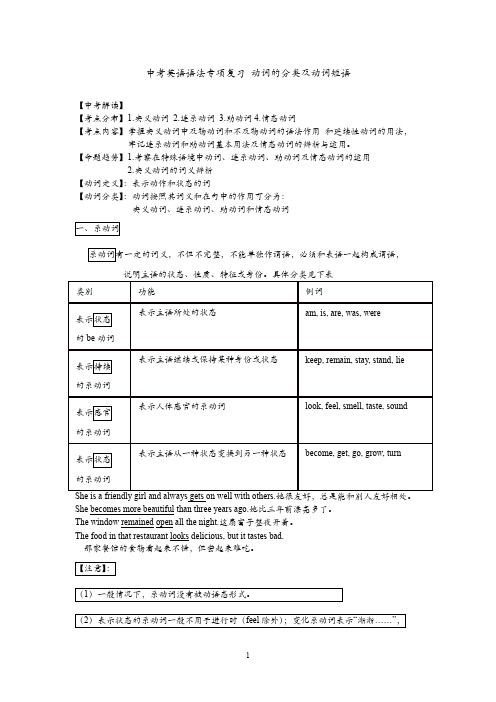
中考英语语法专项复习动词的分类及动词短语【中考解读】【考点分布】1.实义动词2.连系动词3.助动词4.情态动词【考点内容】掌握实义动词中及物动词和不及物动词的语法作用和延续性动词的用法,牢记连系动词和助动词基本用法及情态动词的辨析与运用。
【命题趋势】1.考察在特殊语境中动词、连系动词、助动词及情态动词的运用2.实义动词的词义辨析【动词定义】:表示动作和状态的词【动词分类】:动词按照其词义和在句中的作用可分为:说明主语的状态、性质、特征或身份。
具体分类见下表She is a friendly girl and always gets on well with others.She becomes more beautiful than three years ago.她比三年前漂亮多了。
The window remained open all the night.这扇窗子整夜开着。
The food in that restaurant looks delicious, but it tastes bad.那家餐馆的食物看起来不错,但尝起来难吃。
It’s getting warmer and warmer.天气渐渐变得暖和。
[同步练习]①—The oranges ____________sweet.—Of course. They are from Yongxing, Chenzhou.A.tasteB. eatC. drink②—Why do you ______ so upset?—Because I didn’t get the first place in the English competition.A.lookB.soundC.smellD. feel① —Hello, Lisa. What's the matter?—I ______find my mobile phone. _______ you seen it?A.couldn't; DidB. can't; HaveC. need ; HadD. must; Are ②—Who _____ the first paper in the world?—Cai Lun______A.invented;didB.was invented;wasC.did invented ;wasD.invented;was .③“重要的事情说三遍” can be translated into “Important things must beagain and again and again.”A. spokenB. repeatedC. describedD. introduced Key:B,A,B 三 实义动词实义动词分为及物动词和不及物动词Could I use your computer ?Vegetables help you to keep in good health.make sb do sth let sb do sth have sb do sthsee sb. do sth watch sb. do sth hear sb.do sth notice sb. do sth Tom lent me a book yesterday. 【拓展】 具有类似用法的还有:give sb.sth.= give sth.to sb. pass sb.sth.= pass sth.to sb. post sb.sth.= post sth.to sb. lend give sb.sth.= lend sth.to sb.offer sb.sth.= offer sth.to sb. buy sb.sth.= buy sth.for sb.Tom arrived last Sunday.He talks in a loud voice.She can sing English songs.(及物)She sings well.(不及物)I often listen to music on weekends.She can sing English songs.(及物)She sings well.(不及物)1)动词+介词Tom is looking for his lost pen.What are you talking about?介词之间。
英语动词(一)实义动词、连系动词、助动词

词法词类间的相互关系:1、adj./num./n.可以修饰n.2、adj.可以修饰pron.3、adv.可以修饰v./adj./adv.4、art.接n.5、prep.接n./pron.构成介词短语,共同作句子成分动词(一)【按功能分为——实义动词、连系动词、助动词、情态动词】一、实义动词(表示行为,又称“行为动词”)1、vt及物动词与vi不及物动词(1)vt及物动词(后面能带宾语,大多数动词都是及物动词。
)1)跟双宾语的及物动词。
通常,人(间接宾语)在前,物(直接宾语)在后,“do sb. sth.”。
反之,间接宾语前需加介词。
2)跟复合宾语的及物动词(宾语后必须再加宾语补足语,其意义才完整)(2)vi不及物动词(不能跟宾语。
大多数动词既可作及物动词,又可作不及物动词,纯不及物动词很少。
)常用不及物动词有:ache疼痛、agree、arrive、come、dance、die、disappear、dream、run、sit、stand、say、wait、walk、smile、cry Don't run.There's plenty of time.不要跑,还有足够的时间呢。
The boy smiled when he saw his mother.见到他妈妈,男孩笑了。
We waited until Mom came.我们一直等到妈妈来。
(3)很多实义动词既可以作及物动词,也可以作不及物动词,这样的动词有两种不同的情况:1)作及物动词和不及物动词时,意义相同。
如:read、sing、begin、eat、drink、know、help、tryShall we begin at once?我们可以立刻开始吗?Lucy began working as a librarian after she left school.露西毕业后开始当图书馆管理员。
2)作及物动词和不及物动词时,意义不同。
中考查漏补缺英语语法之动词语法讲解
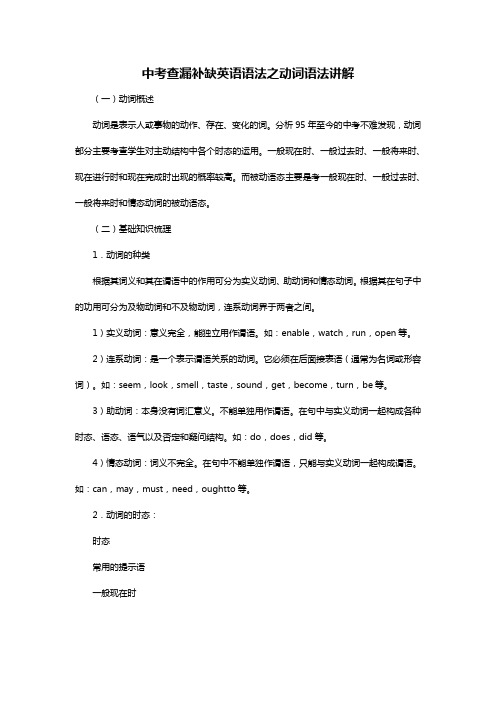
中考查漏补缺英语语法之动词语法讲解(一)动词概述动词是表示人或事物的动作、存在、变化的词。
分析95年至今的中考不难发现,动词部分主要考查学生对主动结构中各个时态的运用。
一般现在时、一般过去时、一般将来时、现在进行时和现在完成时出现的概率较高。
而被动语态主要是考一般现在时、一般过去时、一般将来时和情态动词的被动语态。
(二)基础知识梳理1.动词的种类根据其词义和其在谓语中的作用可分为实义动词、助动词和情态动词。
根据其在句子中的功用可分为及物动词和不及物动词,连系动词界于两者之间。
1)实义动词:意义完全,能独立用作谓语。
如:enable,watch,run,open等。
2)连系动词:是一个表示谓语关系的动词。
它必须在后面接表语(通常为名词或形容词)。
如:seem,look,smell,taste,sound,get,become,turn,be等。
3)助动词:本身没有词汇意义。
不能单独用作谓语。
在句中与实义动词一起构成各种时态、语态、语气以及否定和疑问结构。
如:do,does,did等。
4)情态动词:词义不完全。
在句中不能单独作谓语,只能与实义动词一起构成谓语。
如:can,may,must,need,oughtto等。
2.动词的时态:时态常用的提示语一般现在时always,usually,sometimes,often,every,onceaweek,inthemorning,inDecember,inspring,onMondays等。
一般过去时ago,justnow,before2005,yesterday,lastFriday,once,theotherday,thosedays,onceuponatime,longbefore等。
一般将来时tomorrow,thecoming...,inthefuture,nextTuesday,intwohours,someday,soon,beforelong,thisevening等。
初中英语2025届中考动词考点分类讲解练习(实义动词+系动词+助动词+情态动词)
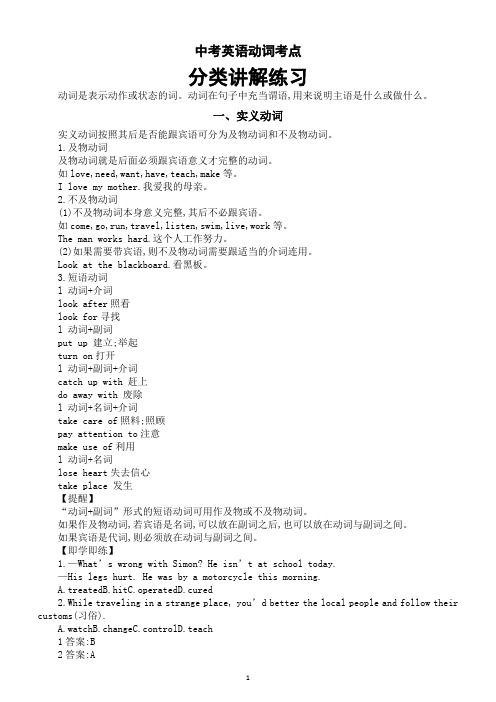
中考英语动词考点分类讲解练习动词是表示动作或状态的词。
动词在句子中充当谓语,用来说明主语是什么或做什么。
一、实义动词实义动词按照其后是否能跟宾语可分为及物动词和不及物动词。
1.及物动词及物动词就是后面必须跟宾语意义才完整的动词。
如love,need,want,have,teach,make等。
I love my mother.我爱我的母亲。
2.不及物动词(1)不及物动词本身意义完整,其后不必跟宾语。
如come,go,run,travel,listen,swim,live,work等。
The man works hard.这个人工作努力。
(2)如果需要带宾语,则不及物动词需要跟适当的介词连用。
Look at the blackboard.看黑板。
3.短语动词l 动词+介词look after照看look for寻找l 动词+副词put up 建立;举起turn on打开l 动词+副词+介词catch up with 赶上do away with 废除l 动词+名词+介词take care of照料;照顾pay attention to注意make use of利用l 动词+名词lose heart失去信心take place 发生【提醒】“动词+副词”形式的短语动词可用作及物或不及物动词。
如果作及物动词,若宾语是名词,可以放在副词之后,也可以放在动词与副词之间。
如果宾语是代词,则必须放在动词与副词之间。
【即学即练】1.—What’s wrong with Simon? He isn’t at school today.—His legs hurt. He was by a motorcycle this morning.A.treatedB.hitC.operatedD.cured2.While traveling in a strange place, you’d better the local people and follow their customs(习俗).A.watchB.changeC.controlD.teach1答案:B2答案:A二、系动词系动词不能单独作谓语,必须与表语一起构成谓语。
初中语法-动词的分类
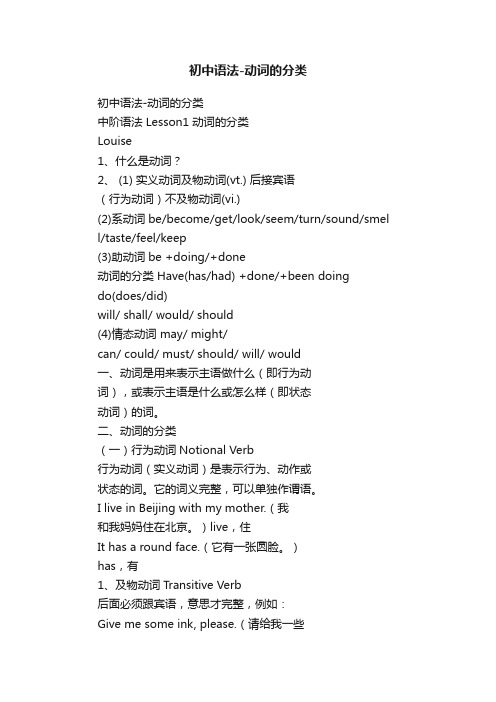
初中语法-动词的分类初中语法-动词的分类中阶语法 Lesson1 动词的分类Louise1、什么是动词?2、 (1) 实义动词及物动词(vt.) 后接宾语(行为动词)不及物动词(vi.)(2)系动词be/become/get/look/seem/turn/sound/smel l/taste/feel/keep(3)助动词be +doing/+done动词的分类 Have(has/had) +done/+been doingdo(does/did)will/ shall/ would/ should(4)情态动词 may/ might/can/ could/ must/ should/ will/ would一、动词是用来表示主语做什么(即行为动词),或表示主语是什么或怎么样(即状态动词)的词。
二、动词的分类(一)行为动词Notional Verb行为动词(实义动词)是表示行为、动作或状态的词。
它的词义完整,可以单独作谓语。
I live in Beijing with my mother.(我和我妈妈住在北京。
)live,住It has a round face.(它有一张圆脸。
)has,有1、及物动词Transitive Verb后面必须跟宾语,意思才完整,例如:Give me some ink, please.(请给我一些墨水。
)If you have any questions, you can raiseyour hands.(如果你们有问题,你们可以举手,。
)2、不及物动词Intransitive Verb后面不能跟宾语,意思已完整。
不及物动词有时可以加上副词或介词,构成短语动词,相当于一个及物动词。
例如:He works hard.(他工作努力。
)Jack runs faster than Mike.(杰克跑步比迈克要快些。
)Please look at the blackboard and listen to me.(请看黑板,听我说。
初中英语动词讲解

动词的分类
• 一、动词的分类、基本形式和用法 • 英语的动词按作用分为实意动词、连系动 词、助动词和情态动词。
一)实意动词
• • • • 一) 实意动词按其是否能直接跟宾语分作及物动词和不 及物动词。 1.及物动词。在句中必须跟宾语才能表达完整意思的实 意动词叫及物动词,它后必须跟宾语,如: I can hear you. hear单独用不能表达完整的意思为 及物动词 I have a book. have单独用不能表达完成的意思为 及物动词。 2.不及物动词。在句中不必跟宾语就能表达完整意思 的动词,如: He left yesterday. leave单独用能表达完整的意思,是 不及物动词。
三)实意动词的形式和用法:
• does, do, doing, did, done • 这几种形式产生了谓语形式和非谓语形式: • 谓语形式:即通过添加助动词构成不同时态,如: • does, do, did, be doing, have done, be done • 非谓语形式:to do, do, doing, done
三、助动词
• 一)助动词本身无词义,不能独立充当谓 语,只能帮助实意动词和不是be的系动词 构成谓语。助动词有四类:be; shall,will; have; do。
1.助动词be的基本形式和用法:
• • • • • 原形:be (情态动词后) 现在式:am, is,are (构成现在进行时或被动式) 过去式:was, were, (构成过去进行时被动式) 现在分词:being (被动进行时) 过去分词:been (完成时或被动式)
2.shall(第一人称),will(二、三人称)帮助动词构成将来 时态。should,would是它们的过去式形式,帮助构成过去将 来时。 3.have构成各种完成时: have(has)帮助构成现在完成时。 had帮助构成过去完成时。 4.do帮助动词构成一般现在时和一般过去时的否定结构和 疑问结构。有do,does,did三种形式。
初中英语动词分类讲解
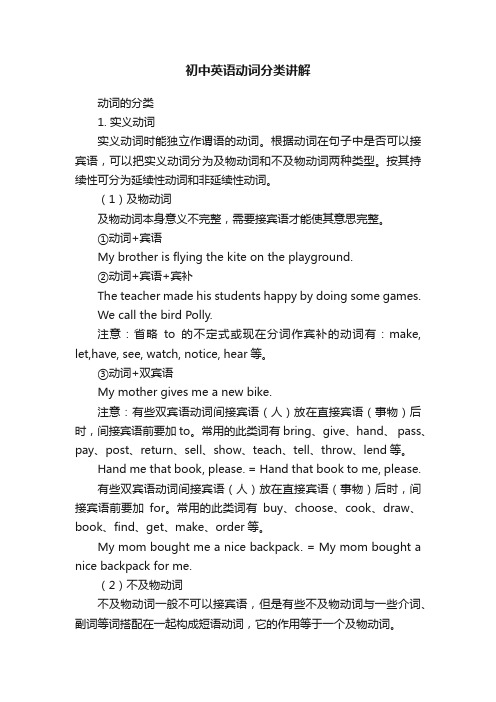
初中英语动词分类讲解动词的分类1. 实义动词实义动词时能独立作谓语的动词。
根据动词在句子中是否可以接宾语,可以把实义动词分为及物动词和不及物动词两种类型。
按其持续性可分为延续性动词和非延续性动词。
(1)及物动词及物动词本身意义不完整,需要接宾语才能使其意思完整。
①动词+宾语My brother is flying the kite on the playground.②动词+宾语+宾补The teacher made his students happy by doing some games.We call the bird Polly.注意:省略to的不定式或现在分词作宾补的动词有:make, let,have, see, watch, notice, hear等。
③动词+双宾语My mother gives me a new bike.注意:有些双宾语动词间接宾语(人)放在直接宾语(事物)后时,间接宾语前要加to。
常用的此类词有bring、give、hand、 pass、pay、post、return、sell、show、teach、tell、throw、lend等。
Hand me that book, please. = Hand that book to me, please.有些双宾语动词间接宾语(人)放在直接宾语(事物)后时,间接宾语前要加for。
常用的此类词有buy、choose、cook、draw、book、find、get、make、order等。
My mom bought me a nice backpack. = My mom bought a nice backpack for me.(2)不及物动词不及物动词一般不可以接宾语,但是有些不及物动词与一些介词、副词等词搭配在一起构成短语动词,它的作用等于一个及物动词。
We arrived at the station at five.He turned off the light when he left.He takes pride in doing a job well.注意:有些动词既可作及物动词也可作不及物动词。
语法动词知识点
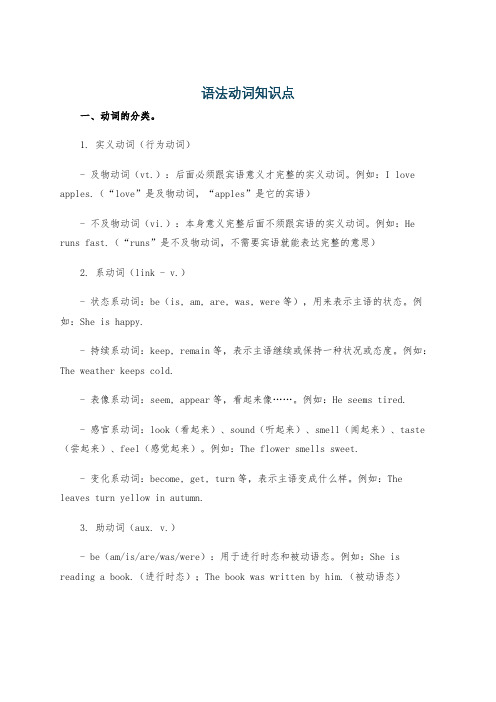
语法动词知识点一、动词的分类。
1. 实义动词(行为动词)- 及物动词(vt.):后面必须跟宾语意义才完整的实义动词。
例如:I love apples.(“love”是及物动词,“apples”是它的宾语)- 不及物动词(vi.):本身意义完整后面不须跟宾语的实义动词。
例如:He runs fast.(“runs”是不及物动词,不需要宾语就能表达完整的意思)2. 系动词(link - v.)- 状态系动词:be(is, am, are, was, were等),用来表示主语的状态。
例如:She is happy.- 持续系动词:keep, remain等,表示主语继续或保持一种状况或态度。
例如:The weather keeps cold.- 表像系动词:seem, appear等,看起来像……。
例如:He seems tired.- 感官系动词:look(看起来)、sound(听起来)、smell(闻起来)、taste (尝起来)、feel(感觉起来)。
例如:The flower smells sweet.- 变化系动词:become, get, turn等,表示主语变成什么样。
例如:The leaves turn yellow in autumn.3. 助动词(aux. v.)- be(am/is/are/was/were):用于进行时态和被动语态。
例如:She is reading a book.(进行时态);The book was written by him.(被动语态)- do/does/did:用于构成疑问句和否定句,以及强调句等。
例如:Do you like music?(疑问句);He doesn't go to school on Sunday.(否定句);I do love you.(强调句)- have/has/had:用于完成时态。
例如:I have finished my homework.4. 情态动词(modal v.)- can/could:表示能力(过去式为could)、许可(在口语中常用)等。
- 1、下载文档前请自行甄别文档内容的完整性,平台不提供额外的编辑、内容补充、找答案等附加服务。
- 2、"仅部分预览"的文档,不可在线预览部分如存在完整性等问题,可反馈申请退款(可完整预览的文档不适用该条件!)。
- 3、如文档侵犯您的权益,请联系客服反馈,我们会尽快为您处理(人工客服工作时间:9:00-18:30)。
动词(I)——实义动词、连系动词、助动词
一、实义动词
又称为行为动词,本身具有比较完整的意义,能够在句中单独作谓语。
分为及物动词vt.与不及物动词vi.两大类
1、vt.后要加宾语才能使其意义完整;而vi.后无须加宾语,其本身就能表达完整的意思
2、当vi.后需要接宾语时,要在其后加上一个合适的介词
二、连系动词
简称系动词,后面必须加形容词、名词、不定式或动名词等表语一起构成系表结构
1、表示“状态”的连系动词,如be,look,smell,taste,sound,feel,keep,stay,remain等
2、表示“变化”的连系动词,如become,turn,get,grow等
三、助动词
本身没有意义,不能独立作谓语,它必须和实义动词一起构成时态、语态、否定和疑问等结构。
英语中常见的助动词有am,is,are,was,were,do,does,did,have,has,had,will,shall,would等
1、助动词be(am,is,are,was,were)用来帮助构成进行时态和被动语态 am/is/are+ doing sth. 现在进行时
was/ were+ doing sth. 过去进行时
be+过去分词被动语态
2、助动词have(has,have,had)用于帮助构成完成时态
has/have +过去分词现在完成时
had +过去分词过去完成时
3、助动词do(does,do,did)用于帮助构成疑问句和否定句;用于强调句,加强说话语气
Do be quiet,children!
4、助动词shall和will用于构成将来时,shall仅用于第一人称,will可用于任何人称
will/shall + v.一般将来时
would/should + v.过去将来时
课堂练习
1.By the time I got outside, the school bus (leave).
2.In order to provide better services for foreigners during the 2nd Youth Olympic Games, lots of bus and taxi drivers are busy (learn) English.
3.Yesterday I a new dress at the Macy's for my mum.( buy)
4.When I got home, my pet dog (lie) on the floor, dead.
5.We are looking forward to (visit) Shanghai World Expo.
6.Many school things were (send) to Yushu last month.
7.There is nothing important in today's newspaper. How about (listen) to the radio?
8.At weekends, Nancy enjoys (read) comic books at home.
9.I don't like eating lemon. It t too sour.
10.Would you like to (分享) your experiences with us?
课后作业
1.—When did your uncle in Shanghai?
—The day before yesterday.
A. arrive
B. get
C. reach
D. go
st Sunday my aunt at home with me. We were watching TV all day
A. was
B. were
C. is
D. are
3.This silk dress so smooth. It's made in China.
A. feels
B. smells
C. sounds
D. tastes
4.How's Annie? I her for a long time.
A. don't see
B. won't see
C. didn't see
D. haven't seen
5.—When Jessy to New York?
—Yesterday.
A. does; get
B. did; get
C. has; got
D. had; got
6.—Where is Ben?
—He to the teachers' office. He will be back soon.
A. go
B. has gone
C. has been
D. goes
7.—Do you often watch Man and Nature on TV?
—Sometimes. It's an interesting program, but I Sports News.
A. prefer
B. want
C. enjoy
D. miss
8.Everyone I come from Sichuan. Actually, I come from Shandong.
A. find
B. think
C. finds
D. thinks
9.Your homework is well done. Just some small mistakes in it.
A. create
B. connect
C. correct
D. control
10.It's too bright and sunny. Why not your sun glasses?
A.break
B. clean
C. make
D. wear
11.The bus is coming. Be careful when you the bus.
A. get on
B. get off
C. get up
D. get to
12.The plane will from Beijing Capital Airport and land in London.
A. take up
B. take out
C. take away
D. take off
13.—What is Mum cooking in the kitchen?
—Fish, I guess. How nice it !
A. looks
B. sounds
C. tastes
D. smells
14.—Thanks for your wonderful dinner. I have to go now.
—It's raining hard. Don't until it stops.
A. arrive
B. stay
C. come
D. leave
15.The small child was not old enough to himself.
A. have
B. wear
C. dress
D. put
16.Don't others. Sometimes you make mistakes too.
A. knock at
B. laught at
C. look at
D. arrive at
17.Doctors tell poeple their hands often and to stay home if they feel ill.
A. to wash
B. washes
C. wash
D. washing
18.—Shall we stay at home watching TV tonight?
—No, I'd like and see a movie.
A.to go
B. go
C. went
D. going
19.The classroom was so dirty. I decided .
A. Clean it up
B. To clean it up
C. Clean up it
D. Cleaning up it
20.She was supposed in hospital, but poeple found her in the office.
A. to lie
B. lying
C. lie
D. lies。
